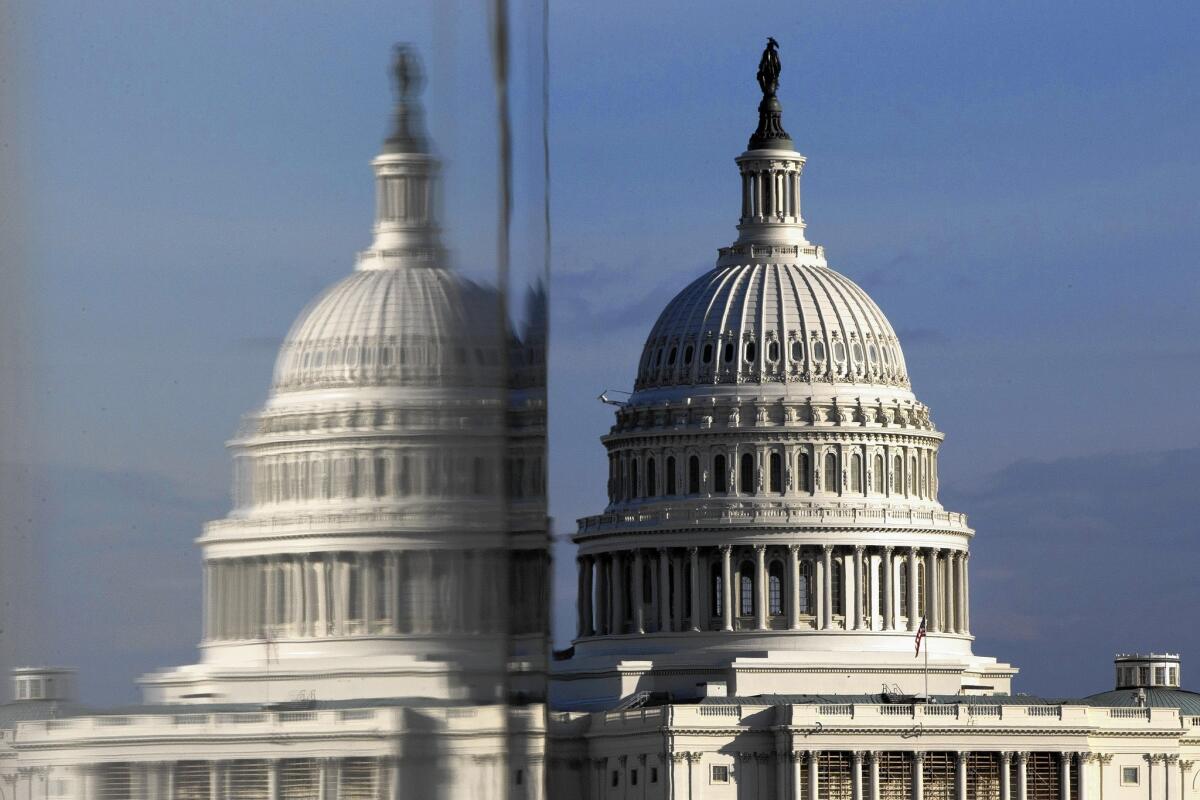Midterm election unlikely to end gridlock in Washington, analysts say

After a summer of upheaval, from the Middle East to Ferguson, Mo., the country swings into a fall campaign with large stakes but little chance of ending the partisan stalemate that has ground Washington to a virtual halt.
If anything, the results of this year’s congressional races could push the two major parties even further apart, leaving President Obama struggling to accomplish much more of lasting significance.
Democrats, who lost control of the House in 2010, stand little chance of winning it back in November. The likeliest outcome, election analysts say, is a modest Republican gain of 10 seats or less, far short of the GOP’s 63-seat landslide in the last midterm election.
The Democratic-run U.S. Senate is up for grabs, with Republicans enjoying a better than even chance of seizing control. They need a gain of just six seats and appear halfway there with a strong probability of victories in Montana, South Dakota and West Virginia.
But even if the GOP takes over the Senate, the margin is expected to be exceedingly narrow, positioning the party to stymie Obama and congressional Democrats but unable to do much to advance its own agenda.
“A lame-duck president coupled with a divided Congress, or one controlled by the opposite party, is not a recipe for a whole lot of productiveness or success,” said Paul Maslin, a veteran Democratic strategist who is working in several campaigns across the country.
Like others, he suggested the most likely outcome after November is more of the same gridlock and unyielding political division. (While Democrats stand a good chance of gaining governors’ seats, that would not change the toxic atmosphere in Washington.) “It might just be punting the ball down the road to 2016,” said Rhodes Cook, a nonpartisan analyst of historic campaign trends.
A status quo election seems paradoxical at a time so many Americans are unhappy with the country’s direction and unsettled by the summer’s barrage of disturbing events: terrorism in the Middle East, an Ebola outbreak in Africa, the Russian incursion in Ukraine, the police shooting of Michael Brown in the St. Louis suburb of Ferguson.
But a lack of competitive House seats, owing to districts strongly favoring one party or the other, and voters’ inclination to sit out the midterm election, due to apathy or frustration, both contribute to the political inertia.
An August survey for the Wall Street Journal and NBC News was telling. The nationwide sampling found widespread discontent despite signs of a steadily strengthening economy. More than 7 in 10 adults felt the country was on the wrong track and nearly 8 in 10 believe the next generation of Americans will be worse off.
Asked if something upset them enough to carry a protest sign for a day, nearly 60% of respondents said yes. “For now, neither party seems to offer much hope,” said Peter Hart, a Democratic pollster who helped conduct the survey with a Republican partner, Bill McInturff.
Indeed, research this summer by the Center for the Study of the American Electorate found eligible voters staying away from the polls in droves, with more than a dozen states, including California, reporting record low turnout.
And yet for all of the contempt for Congress, which is saddled with some of the lowest approval ratings ever recorded, there has been markedly little turnover.
With the primary season just about ended, only three House members have lost renomination out of hundreds seeking another term. The highest-profile casualty was the former No. 2 House leader, Virginia Republican Eric Cantor.
That pattern is not likely to change. Handicappers say there are only about three dozen competitive House races in November — and only about half of those are true toss-ups — considerably less than the norm for a chamber of 435 seats.
That is not to say there will be no change on Capitol Hill. If anything, the House may grow increasingly polarized as lawmakers of a more liberal or conservative bent, depending on the district, replace comparatively more moderate members.
Beyond philosophy, there is the physical makeup of the House. David Wasserman, who analyzes House races for the nonpartisan Cook Political Report, notes that 2012 yielded a milestone: For the first time, more than half the Democrats in the House are either women or minorities, while the overwhelming majority of Republicans are white men. With 50 or so new members expected — a result mostly of retirements — the disparity is expected to grow more even dramatic after November, Wasserman said.
On the Senate side, the primaries delivered no shake-up; not a single incumbent lost despite early threats to more than half a dozen Republicans who faced tea party challengers. Most hung on by moving rightward.
Senators run statewide, not in districts with a more partisan slant, so there is considerably more competition among the 36 seats on the ballot in November. Still, both the map and the math strongly favor Republicans. Virtually all of the dozen or so most competitive races are for Democratic-held seats; more than half of those are in states that Obama lost in 2012, including Alaska, Arkansas, Louisiana and North Carolina.
Barring a highly unlikely GOP tsunami, however, the most probable outcome is a Senate balanced on a razor’s edge, with one or the other party in control by at most a few seats, well below the 60 votes needed for an effective working majority.
The difference between Democratic or GOP control would be significant. Republican control, by even the slimmest margin, could end Obama’s already limited ability to work with Congress and make it far more difficult to confirm his appointments at a time, the final two years of a presidency, when high-level positions typically open up.
But even with that change there is no talk this election season of breaking Washington’s partisan fever, a hope that Obama held out in 2012 — with wild optimism, as events proved.
Norman Ornstein, a longtime student of Congress at the American Enterprise Institute, has written extensively on the capital’s dysfunction and political impasse and sees no reason to hope for better after November.
“Looking ahead reminds me of John McCain’s famous comment,” Ornstein said, quoting a favorite bit of the Arizona senator’s mordant humor: “It’s always darkest just before it turns completely black.”
Twitter: @markzbarabak
More to Read
Start your day right
Sign up for Essential California for news, features and recommendations from the L.A. Times and beyond in your inbox six days a week.
You may occasionally receive promotional content from the Los Angeles Times.







